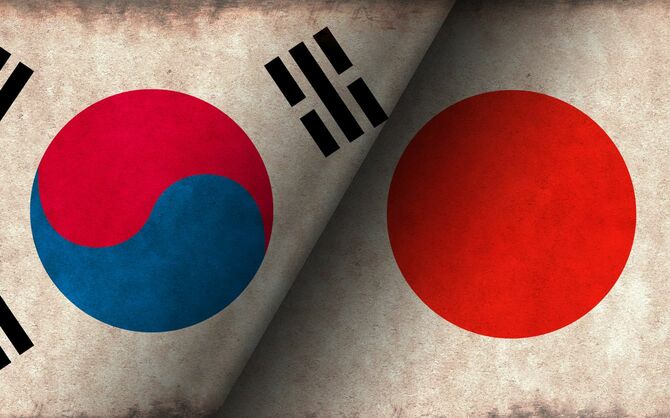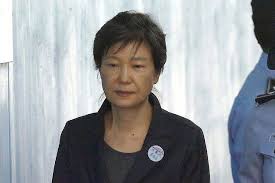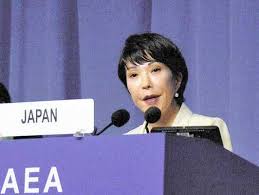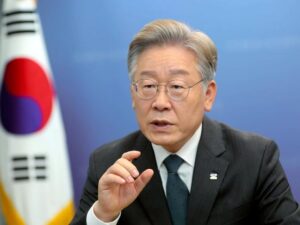When former President Park Geun-hye expressed regret that the South Korea-Japan comfort women agreement concluded in December 2015 has been neutralized by the Moon Jae-in administration, the opposition parties collectively reacted. [Photo] Former President Park Geun-hye poses for a commemorative photo with former Prime Minister Abe. In her memoirs published in the Joongang Ilbo on April 4, Park revealed, “When I heard in prison that the comfort women agreement, which I had put my heart and soul into, was later unilaterally and effectively annulled by the Moon Jae-in administration, I was filled with an indescribable and tragic feeling.” This is the first time Park has clarified her position in relation to the ROK-Japan comfort women agreement. In a phone call with The JoongAng Ilbo on the same day, a member of the opposition (Co-operative Democratic Party) from the Moon Jae-in administration’s Cheong Wa Dae (presidential office) said, “All candidates, including Hong Jun-pyo, the candidate of the Liberty Korea Party (the predecessor of the People’s Power) in the 2017 presidential election, were talking about ‘renegotiating the comfort women agreement,'” and added, “This was This was not just an issue for the Moon Jae-in administration,” he said. A diplomat in the Moon Jae-in administration also commented that “the situation at the time was that both the ruling and opposition parties accepted that the agreement was wrong,” and that “there was sympathy among the ruling and opposition parties for the fact that the parties could not accept the agreement and that the public was also not convinced by it. The opposition also objected to former President Park’s description of the agreement as having been “effectively abandoned,” saying that this was “not true. A source in the Moon Jae-in administration’s Cheongwadae Security Office said, “The agreement between the two countries was clearly and publicly stated [by the Moon Jae-in administration] that it should be protected, not abrogated,” and a Democratic Party lawmaker from Cheongwadae said, “The word ‘abrogated’ was not used at the Foreign Affairs Ministry at the time.” The opposition also criticized Park’s assessment in her memoirs that, while citing the Japanese government’s contribution of 1 billion yen as an achievement, “Receiving 1 billion yen from the Japanese national budget can be interpreted as an acceptance of Japan’s indirect state responsibility. The logic being that “the public and the victims could not accept a solution that ends with the handing over of money,” according to an official in the security office of the Moon Jae-in administration’s Cheong Wa Dae. The Reconciliation and Healing Foundation, established by the Park Geun-hye administration with contributions from the Japanese government, was dissolved in November 2018, when Moon Jae-in was in power. In her memoirs, former President Park wrote, “Prior to the agreement (between South Korea and Japan), I instructed the Korean Council Against the Para-Taiko (Para-Taiko Council, the predecessor of Solidarity with Memory of Justice) to fully inform and seek understanding from their side. The part that states, “We later found out that the Para-Taiwan Council had not informed the grandmother at all,” is also controversial. A Moon Jae-in administration official said, “The Moon Jae-in administration’s Korea-Japan Comfort Women Task Force concluded that the Park Geun-hye administration did not seek sufficient consent from the victims,” and that “if there were any who were partially alienated, [the Park Geun-hye administration] had to find a solution. The Joongang Ilbo called and sent a message to Yun Mi-hyang, the then permanent representative of the Para-Taiwan Consultative Assembly, to ask her position, but she did not respond. On the other hand, the ruling party appreciated the fact that “through the memoirs, former President Park’s painstaking efforts were expressed. An official in the president’s office said, “In Korea, when there is a change of government in diplomacy and security, all the achievements of the previous administration tend to be erased or denied,” and “We believe that Park’s experience has some implications for the current administration. A leading member of the National People’s Power also explained that “Prime Minister Shinzo Abe apologized directly, and what is important is the fact that the Japanese government eventually paid the money even though it did not admit legal responsibility,” and that “it means an indirect admission of legal responsibility. A leading member of the ruling party, who met with Prime Minister Abe in April of last year at an official gathering, also expressed regret over the abandonment of the ROK-Japan comfort women agreement, saying, “While Prime Minister Abe talked about ‘his efforts to bring about the comfort women agreement and his own very difficult decision,’ he asked former President Park if she was okay.












